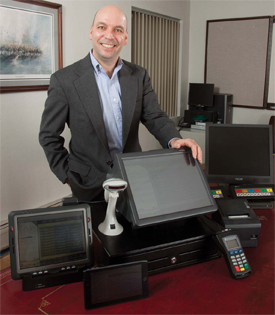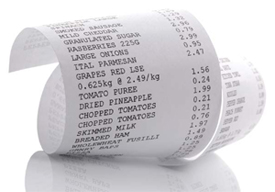Reinventing Retail & Restaurant POS
By Mike Monocello, chief editor, Business Solutions magazine.
Facing a changing economy and a stagnant market, this ISV (independent software vendor) rebuilt its software to revitalize its sales.

When the economy took its downturn a few years ago, many companies were forced to make significant changes. Some reduced staff and other expenses. Some branched out into new markets. Some added new products. In the case of software developer LionWise, the ISV did all of the above. Those changes resulted in a company which increased its new business by 42% in 2011 and expects 15% sales revenue growth in 2012.
Changing Economy Means Change In Market Strategy
At the time of the economic downturn, LionWise was just a few years old with sales just getting off the ground. The principals of LionWise, including President Scott Filiault, had decades of experience creating software for the manufacturing vertical. When they formed LionWise, they hired consultants to perform research on which markets held potential for a software package. The ISV followed the consultant’s recommendation and created new software aimed at the high-end table service market. Its direct sales force had immediate success, and things were looking good. Then, the economy turned, the high-end table service market fell on tough times, and sales slumped. Filiault likens LionWise’s situation to that of the SUV Hummer. “Back in 2005 when the economy was great, Hummer was all the rage,” he says. “People wanted bigger, better, with more toys. I’m sure there was at least one guy at Hummer who sat in a conference room and wondered aloud if they should make a smaller Hummer that got 40 MPG. People probably told that person they were nuts; after all, it’s their brand to be big and over the top. Today, Hummer doesn’t exist.” The ISV continues to explain that LionWise was in a similar situation, having a very highend product in terms of price, cost to implement, the amount of service required, and the amount of customer hand-holding.

With these factors, the contraction of the credit market, shrinking margins, an increase in competition, and generally higher costs to doing business, Filiault says it was easy to see that the young company was going to have to change. LionWise needed a product that could be sold at a lower price point, a lower cost to implement, and without the hand-holding. Additionally, Filiault and his team decided to expand its software to support momand- pops and other forms of dining apart from the highend market it originally targeted. The ISV also decided to expand into retail.
In early 2009, LionWise spent time working on its new product. In 2010, the company emerged with its new offering. The company’s development approach/code base made creating new software not only possible, but fast. “If you know anything about software for the manufacturing vertical, generically speaking, a part is a part and is tracked whether it’s on a shelf or part of a bigger build,” Filiault explains. “We looked at the POS world the same way, as an item is an item. Whether you make that item available on a store shelf, a website, a menu, or as an ingredient, it’s just an item.” With that logic in mind, LionWise software, using the same underlying code, is able to function for both restaurants and retailers. Filiault is quick to note that LionWise isn’t just a food service package masquerading as retail or vice versa. Rather, there are operational workflows, support for inventory structures, operational cash flows, etc. that make the software perform uniquely for each market.
The ability for the software to handle both retail and restaurant functions plays strongly to a new combined market Filiault has seen. “Many merchants are doing the same thing we did, by expanding their product offerings into areas they can fit,” he says, referring to butcher shops selling menu-based food items and cigar shops selling liquor. Many merchants with a well-branded product are looking to increase sales by also selling it on a shelf or menu. If you’re familiar with Cracker Barrel’s design, the restaurant also has a retail section. LionWise can handle transactions of both types, which has given the ISV more markets to sell into.
 “In attempting to build a reseller program, we discovered that there are a lot of POS VARs who are tired and not feeling up to bringing a new software product to market.”
“In attempting to build a reseller program, we discovered that there are a lot of POS VARs who are tired and not feeling up to bringing a new software product to market.”
— Scott Filiault, LionWise
When the software is configured, customers decide how the software should be used. From a security and operational flow standpoint, customers can also dictate what operational workflows employees see based on who the employee is. They can have one employee log in to a terminal and gets a general retail interface and another who gets a menu-based ordering system. If a retail shop closes at 7 but its restaurant stays open until 11, employees can still make retail purchases by accessing the retail screens on the software. “One challenge we’ve had is convincing people that they can have the best of both worlds,” says Filiault. “Our competition says you can’t have the same software handle these different verticals, which is absolutely not true. The fact that most developers don’t do it has nothing to do with whether it can or can’t be done.”
Aging POS Channel Not Interested In New Products?
Product changes aside, the ISV also faced sales challenges. As part of its restructuring, the company downsized from 20 to 10, with 5 being salespeople. So, how can a software company with a POS product that can fit any vertical reach customers across the United States? The obvious answer would be to develop a reseller channel. While Filiault says developing a reseller channel is definitely part of the ISV’s long-term plans for success, right now it’s just not a high priority. “Actually, we looked at the channel before the market went south,” says Filiault. “In attempting to build a reseller program, we discovered that there are a lot of POS VARs who are tired and not feeling up to bringing a new software product to market.” Not surprising news. At its last few conferences, the RSPA (Retail Solutions Providers Association) has been talking about “channel sustainability,” addressing the fact that many members of the POS channel are reaching retirement age while new young VARs are few and far between. “We plan on coming back to the channel at some point, but not until we have an established brand and reputation,” says Filiault. He adds that LionWise also wants to have a customer base in a region before establishing a channel in that area. Until that time comes, LionWise has been relying on its small sales force and strategic cooperative partnerships (see sidebar on page 32) to land sales.
With these partnerships and a product that now fits a variety of markets, LionWise had a great 2011. Sales revenue grew 8% last year, and, based on preliminary figures, Filiault is projecting almost double that in 2012. Constantly looking to improve, the company is currently planning new mobile tablet/smartphone-based functionality which could make 2012 an even better year.

